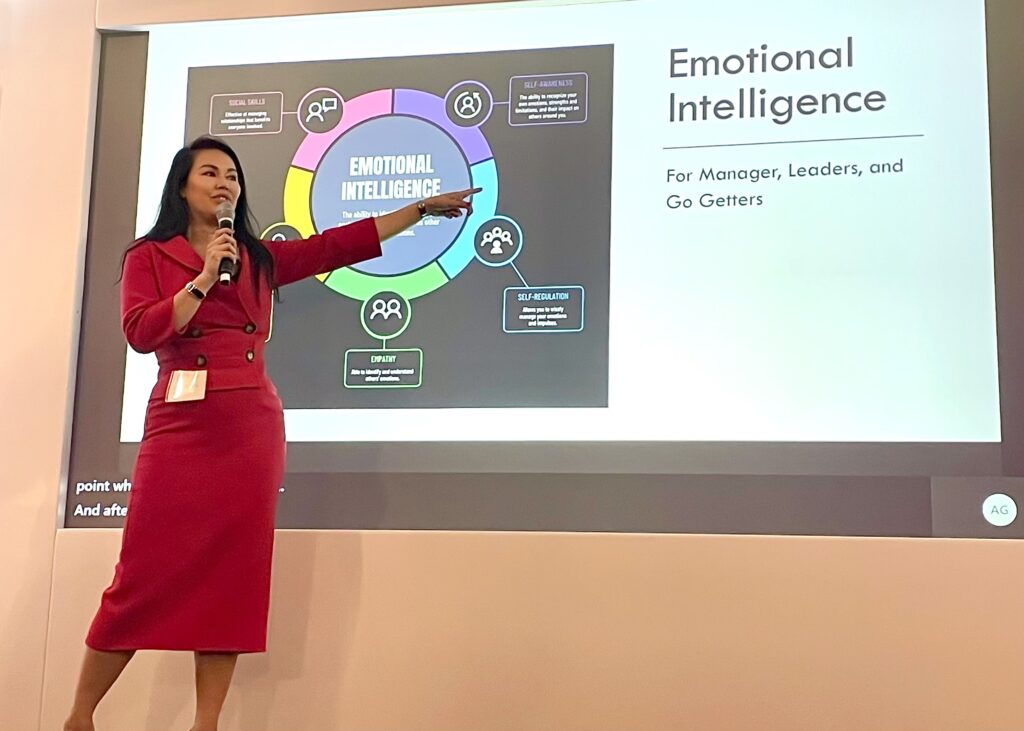EQ is Powerful : 8 Benefits of Emotionally Intelligent Leaders

Emotional intelligence is a crucial attribute for any leader, and it can significantly impact the success of their team and organization. Emotionally intelligent leaders possess qualities that enable them to effectively understand, regulate, and express their emotions and those of others.
Eight benefits of emotionally intelligent leaders:
- Improved communication
Emotionally intelligent leaders are excellent communicators. They can understand how others feel, which allows them to tailor their message to connect with their team on a deeper level. They are also adept at expressing their own emotions in a clear and concise manner, leading to a more productive and positive work environment. - Enhanced empathy
Leaders who possess high emotional intelligence can empathize with their team members. They can put themselves in their team’s shoes, which leads to better relationships, trust, and respect. In addition, empathy enables leaders to create a supportive environment, leading to greater job satisfaction and employee engagement. - Better conflict resolution
Emotionally intelligent leaders can manage conflicts effectively. They understand the importance of finding a resolution that benefits all parties, creating a win-win situation. Emotionally intelligent leaders are skilled at diffusing tension, de-escalating conflicts, and bringing people together. - Increased productivity
Emotionally intelligent leaders can improve productivity by promoting a positive work environment. They can create a culture that values collaboration, innovation, and creativity, leading to better problem-solving and decision-making. They also know how to motivate their team, ensuring that everyone is working towards a common goal. - Greater self-awareness
Emotionally intelligent leaders are highly self-aware. They understand their own emotions, strengths, and weaknesses, leading to better decision-making and improved relationships with their team members. Self-awareness also enables leaders to recognize when they need to take a step back, leading to improved self-care and work-life balance. - Improved team morale
Leaders who possess emotional intelligence can improve team morale by fostering a positive work environment. They can celebrate successes, acknowledge accomplishments, and provide constructive feedback when necessary. Emotionally intelligent leaders are also highly approachable, making it easier for team members to voice their concerns and ideas. - Increased adaptability
Emotionally intelligent leaders are highly adaptable. They can pivot quickly when faced with unforeseen challenges, and they understand the importance of staying calm under pressure. Adaptability enables leaders to effectively lead their teams through change, leading to improved resilience and agility. - Improved decision-making
Emotionally intelligent leaders are highly skilled at decision-making. They can weigh the pros and cons, consider the impact of their decisions on their team and organization, and make informed choices that align with their values and goals. Their ability to regulate their emotions enables them to make decisions that are objective, fair, and effective.
Tips on how you can become more emotionally intelligent:
- Practice self-reflection: Spend some time reflecting on your emotions, thoughts, and actions. Consider the impact of your behavior on others and how you can improve your communication skills.
- Develop empathy: Try to understand others’ perspectives and feelings by putting yourself in their shoes. Practice active listening and ask open-ended questions to learn more about their experiences.
- Learn to regulate your emotions: Recognize and manage your emotions in a healthy way. Take a few deep breaths, go for a walk, or practice mindfulness techniques to calm your mind and body.
- Practice effective communication: Learn to express your emotions in a clear, concise, and respectful manner. Be open and honest with your team members, and provide constructive feedback when necessary.
- Seek feedback: Ask for feedback from your team members, peers, and superiors. Take their feedback constructively and use it to improve your emotional intelligence.
- Learn from others: Observe how other emotionally intelligent leaders communicate, manage conflicts, and build relationships with their team members. Incorporate their best practices into your leadership style.
- Practice patience: Developing emotional intelligence takes time and practice. Be patient with yourself and others, and recognize that mistakes are a natural part of the learning process.
In conclusion, emotionally intelligent leaders possess a set of skills and qualities that enable them to lead their teams more effectively. They are excellent communicators, empathetic, skilled at conflict resolution, and can improve productivity, team morale, and decision-making. Emotionally intelligent leaders are also highly self-aware, adaptable, and can manage change effectively. By prioritizing emotional intelligence in their leadership style, leaders can create a positive work environment that values collaboration, innovation, and creativity, leading to improved organizational success.
If you wish to learn more about Emotional Intelligence and how to improve the EQ of your teams then contact us today for 121 or group training sessions hosted by our expert Gina Maria Buckney. To learn more about why EQ is becoming more in demand than IQ in the boardroom, take a read of this article.

Recent Posts
- KPMG’s Wellbeing Blueprint: 🌍 YPP Spotlight 30 June 2025
- Microsoft’s Culture Of Inclusive Allyship Leads The Way: 🌍 YPP Spotlight 24 June 2025
- How remote-first tech powerhouse, Atlassian, strives to build a Global Culture of Care, one Wellness Day at a time 16 June 2025
- From Toxic to Thriving: The Business Case for Kindness in the Workplace 9 June 2025
- AI-Driven Workplace vs Human First: How to Keep Empathy Alive 17 April 2025